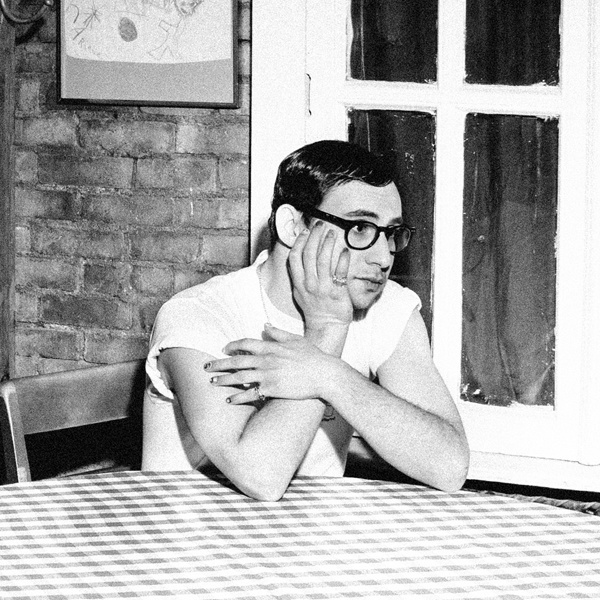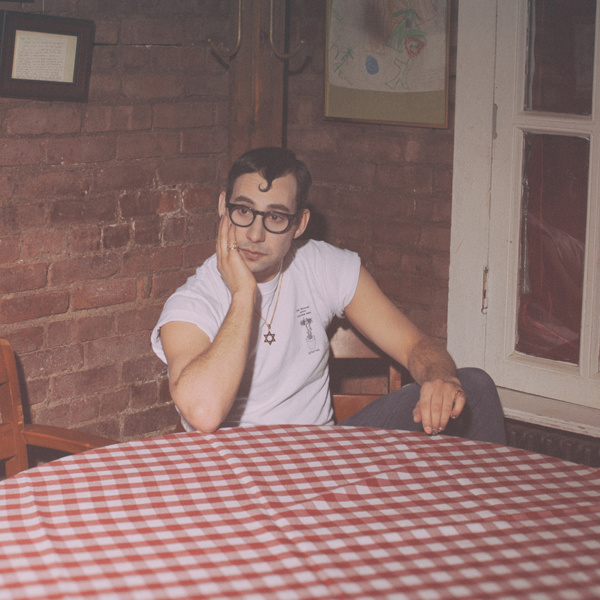On his latest single ‘Don’t Take The Money’ from his solo project Bleachers, Jack Antonoff sings, “You steal the air out of my lungs, you make me feel it,” an euphoric statement about love, and the power of relationships.
‘Gone Now’ is set to be Bleachers' sophomore record following 2014’s ‘Strange Desire’, a record Antonoff likens to a house - with different types of songs as different rooms, and ‘Don’t Take The Money’ being the front door - an insight into what’s to come on the album.
We spoke to an insightful and thoughtful Jack Antonoff last week about his upcoming sophomore Bleachers album, the currency of love, and his plans to return to New Zealand…
...it’s about making music that reflects what it’s actually like to be alive.
COUP DE MAIN: You last visited New Zealand all the way back in 2012 with fun., so firstly, when can we expect to see Bleachers down in New Zealand for a show?
BLEACHERS - JACK ANTONOFF: As soon as possible. When I went with fun. in 2012 it was the only time I’ve ever been to New Zealand and I loved it, and I thought it was the most beautiful country, and the fans were incredible. Very, very, very soon. That’s an actual promise, and I don’t break promises. I will be in New Zealand soon.
CDM: I will hold you to that promise! "Love was a currency," you sing in the second line of your new single, 'Don’t Take The Money', and it’s a really interesting concept, to think of love as a form that can be traded, exchanged, and used to buy things. Do you think the way that people think about love and how it operates has changed over time? Has the way you think about love changed?
JACK: My feelings on love, which is essentially where the song comes from, have changed massively since I’ve been in the relationship that I’m in now. Which is... you start to realise how deep you can go when you really expose yourself to someone, and you really give them the version of yourself that’s a big mess. You let them sift through that with you, and the song is about two people coming together with all this baggage and these big messes. The verses are talking about the past, "Somebody broke me once." The line, "Love was a currency," is talking about all the messed up ways in which you could imagine loving someone. The pre-chorus is this big fight, and then the chorus is this massive euphoria that when you really love someone-- [it] comes after you’ve hit the bottom where you try to give someone every reason to leave you. You give them the worst parts of yourself, you yell and you fight, and all these things - "We fight, stay up late, in my dreams, I’m to blame" - all this crap, and then they don’t leave. And you finally are left at this place where you’re like, "Oh, you’re not gonna leave, I guess we can celebrate this love."
CDM: Do you think there are other forms of human emotion that are used as currencies in relationships, be they platonic or romantic?
JACK: Yeah. I think that any form of emotion that’s used as currency is a damaging one, and I think it’s the way a lot of us interact with each other. And then the people that you really love, and who really love you, that’s not what’s going on. There’s no upper hand, there’s no power struggle, it’s just two people trying to exist together. That’s currency; that’s power. People talk about power in currency, and who has the upper hand - these are always things that are existing in relationships, but they’re not what makes people grow. They’re not what makes things interesting. They’re just what makes things dysfunctional.

CDM: What do you think is the strongest human emotion?
JACK: Maybe the strongest human emotion has to do with death. I think-- it’s not really a correct answer because it’s not really an emotion. I’m not really answering the question you asked, but I think looking at one’s life and thinking about what you hope to do in your life - who you want to love, what you want to create, what you want to build, what you want to destroy, et cetera, I think that is when the biggest emotions exist. I think that’s the baseline of why we love people, is because we have this finite amount of time. And I don’t think there’d be love if we lived forever.
CDM: "When you're looking at your shadow / Standing on the edge of yourself," you sing in the talk-sing part of the song, which is a really introspective moment in the song. Have you found writing and recording this album a way to explore your own personality further?
JACK: Oh, deeply. I made this album mostly alone, in my apartment in New York. So I think in many ways it sounds like a person losing their mind alone in the room, trying to make sense of all these thoughts, and fears, and feelings. That’s the only way I’ve ever known how to learn more about myself - to write. It’s the only way that I can understand myself. I couldn’t just sit down and tell you everything about myself, but I can listen to the records I make, and start to piece together the giant puzzle - why I am the way I am.
CDM: In a newsletter sent out to your fans, and in your Billboard interview, you refer to 'Don’t Take The Money' as the "front door" to the upcoming Bleachers album, which is why you chose it as the first single. Are there any other songs on the album you associate with parts of a house, e.g. the kitchen?
JACK: Yeah! I look at things like a house, because you have the basement, you have the attic. You have these songs you might only go to once a week, there’s all these different things that bring you to different parts of the house. There’s the rooms you live in a lot, the bedroom you sleep in every night, songs you go back to over and over again. Maybe the living room is where you watch TV, and have fun, and have parties, and I just see albums as houses. And until there’s a full house with everything from a spider-webbed attic to a beautiful front door-- certain songs are just little back-sheds that only a few people ever see, <laughs> and certain songs are this giant terrace that the whole world can see when they drive by - and all of it’s important. It’s all part of creating a body of work that speaks to all the emotions and isn’t just for one thing. I would never want to make music that’s for one thing, 'Oh, this music is good for making out to,' or, 'This music is good for crying to.' You want these records to have all of it - their whole life-force.
CDM: Often houses are used as metaphors in psychology to explore personalities, so it’s quite apt to use to describe an album.
JACK: Yeah, it really is.

CDM: In the chorus you sing, "You make me feel it" - what, to you, is “IT”?
JACK: Well, I say, "You steal the air out of my lungs / You make me feel it," so specifically I’m talking about the feeling of when someone steals the air out of your lungs. When someone, in your lungs and your gut, you feel it all there. When the person who I’m with, who I love, can take my breath away, and then can really... to take someone’s breath away and make them feel it, it speaks to the power that someone does have. It is. And also that power is terrifying, because when you realise someone has that much power, you start saying to yourself, 'Okay, you steal the air out of my lungs, you make me feel it, that’s a lot of power. What if you use it the wrong way?'
CDM: How does Jack Antonoff truly feel/express love?
JACK: I think if I really, really love someone, I like to make fun of them a lot. Yeah. I’m a big, big teaser. I really do a lot of pranks, and just like to ruthlessly make fun of the people I love.
CDM: Do you think that the acquisition or the preservation of love is harder?
JACK: It’s all hard. I don’t know what’s harder, but I know that every inch of it is hard, and every inch of it is exciting because of how hard it is.
CDM: When we last spoke to you on the phone back in 2012, you said that you’d started listening to Tegan and Sara, "Because when I started listening to them it was a time when I was really frustrated with modern music." Is this a frustration that you still feel in relation to today’s modern music?
JACK: I feel more optimistic about modern music. There’s always going to be frustration with what gets served to the masses as quality. We see it in music, we see it in film, we see it in fucking food! If we assume people are stupid, then that’s what we’re going to get. If we assume they’re smart, then that’s what we’re going to get. If we blast crap on the airwaves, then that’s what the people are going to hear. If we blast good music, then that’s what the people are going to hear. Whatever records I’m making, I always think to myself, 'People are so smart. They’re so smart, and they’re so emotional, and they have so much depth, so let’s make work that is worthy of that.' Let’s not make work that assumes people are stupid or just points out the way people can we stupid, because why would I be interested in all those horrible parts of humanity? I’m interested in the parts of humanity that get people to listen to music, and inject their emotions into it, and come to the shows, and share that experience all together. That’s why I do this.
CDM: How’s your book 'Record Store' coming along?
JACK: It’s coming! I’ve been working on it, non-stop. It’s a very big project. It has to be done very correctly, so I’m just working with lots of different contributors, putting together different pieces, and looking from the art point of view of how it’s going to look and feel - just kind of creating the whole house that is that project.
CDM: It’s rad that on your upcoming tour, you’re donating $1 from each ticket to Ally Coalition, a foundation very close to your own heart, and you’ve previously encouraged fans to raise money with the Time To Step Up With Bleachers and Donate Hats With Bleachers campaigns. Are there any other campaigns you want to lobby for with the Coalition?
JACK: There’s tonnes of stuff, but our main focus right now is homeless LGBTQ youth. Particularly what’s going on in America right now, with Trump, it’s a horrible situation, the people most affected are the already oppressed communities, and in this case LGBTQ youth of colour - these are people that are horribly affected by our government and they need the most help. So when I go to every city, I invite a local organisation, and raise money. It’s tough because we live in these times where you can feel so helpless, but I think the best thing to do is to look locally, and try to find small way to do something.
CDM: The single artwork cover for 'Don’t Take The Money' features Flawless Sabrina - and Flawless Jack as well, in my opinion - an iconic pioneer in the transgender and gay communities. What made you decide to use Sabrina for the artwork of the song?
JACK: <laughs> Well first of all, that’s very sweet, what you said. Sabrina is an incredible icon who’s had an incredible life, and I wanted to be pictured with someone who is much older than me, because there’s a lot of content on the album, and a song about moving on, and I like the idea of there being almost two of me - me in the present, and then this older version, of my essence from another time. I have a friend named Paul [Monroe] who does a lot of creative work with me, who was friends with Sabrina, and I met her with Paul, and I just became absolutely fascinated with her life and her work. She’s done this amazing thing where she’s just an incredible human being who’s done incredible things and lived an incredibly fascinating life, and I just wanted to celebrate everything that she is.
CDM: You just did a live scoring to 'The Breakfast Club' - if you could write a song to soundtrack any iconic scene from any other John Hughes movie, what would it be?
JACK: I think I’d like to do... That’s a really tough question. The really emotional scene in 'Planes, Trains & Automobiles' is sort of like the one of the most special friendship scenes of all time, and I’d love to put something really heart-wrenching behind that.
CDM: You often refer to the "intense push and pull between euphoria and sadness" - from in your own music, to the music you love, like Robyn, and other artists that make Dance-Cry music, which I feel is also an expression of euphoria and sadness. What is it about this genre (if you can call it a genre) that is so appealing to human nature, do you think?
JACK: That’s our experience. I think when you walk down the street, we see friends, we live our lives, we go to work, and all we think is we’re just bouncing back and forth between wanting to weep and crawl into a hole, and wanting to dance and hug everyone we know - it’s somewhere in the middle, that we just glide every day. Most people don’t cry all day, or feel utter euphoria all day, we just constantly volley back and forth, and that’s what the songs are. They’re not just one mood, maybe the beat makes you want to be with your friends and enjoy your life, maybe the lyrics make you want to weep and be alone, maybe the guitar and synths make you feel deeply nostalgic, maybe the space makes you feel like moving your body, it’s all different feelings. So it’s about making music that reflects what it’s actually like to be alive.
CDM: Are there any up-and-coming artists that you’d like to recommend?
JACK: I love The Lemon Twigs. I think they’re really special, and are essentially bringing back a certain kind of rock music that I love.
Bleachers' album 'Gone Now' is set for release on June 2 - click here to pre-order it.
Listen to 'Don't Take The Money' below...



 Jack Antonoff
Jack Antonoff







